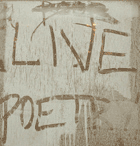(June 2005) Mmm. Am eating an iceberg lettuce leaf filled with chopped tofu, carrots, celery, peppers, noodles, and hoison sauce and love how crisp the lettuce tastes against those darker flavors.
Tonight’s sit-on-the-deck-and-watch-the-fireflies-while-pondering-the-meaning-of-life topic is love (that bitch). Now this is going to seem like a great big leap at first, but I’ve been thinking about the US’s Christianists/jihadists who were forced to identify a new enemy after the fall of Communism in order to continue raking in the dough of the paranoid um hateful faithful. But what new enemy could be powerful enough to incite the fear and hatred and calls-to-arms required to replace something so big as Communisim? Why, homosexuality, of course ... coz love—or at least that dare not speak its nam—iis oh so threatening to the fearful heterosexuals.
Then THAT got me thinking about John Donne.
I am fascinated by seventeenth-century Western writers in much the same way as I’m fascinated by Lost Generation writers and artists and Writers of Witness in general. Why? Because the belief systems that that their cultures were built upon crumbled around them and left them facing a differently illuminated world.
Fortunately, instead of looking for a convenient new enemy to give their lives meaning, though, these artists instead discovered whole new possibilities for expression.
The discovery of heliocentrism and the consequential collapse of the Great Chain of Being cosmology caused a sea change in the seventeenth century, and left poets with the difficult task of trying to find new meaning. So what did these poets do? Well, unlike the American jihadists who reached for hate, these creative types reached for love and made this relatively new romantic phenomenon the subject of their works.
Donne’s explorations are particularly fascinating because he wrote so much process poetry. These loose lyrics allow readers to journey with him through a process of discovery that immerses us in his various examinations of love.
In “The Flea,” a man tries to seduce a woman by claiming that, since a flea bit them both, they’re already one anyway, so why not REALLY become one? He says it better than that though:
It suck’d me first, and now sucks thee, And in this flea, our two bloods mingled bee.”
Interesting premise that definitely competes with some of the bad pick-up lines I’ve heard in my time!
In “The Sunne Extasie,” human bodies are merely statues that hold lovers’ souls and they’re useful only insomuch as they serve as vehicles that allow “pure lovers” to meet one another. When lovers’ souls are joined, the poet says, they are mixed together by love, and this alchemy produces a newer, purer growth. This transplanting of souls is the path to self-knowledge, which makes lovers immune to change.
The spiritual aspects of love are what’s important to Donne, who asserts that very little changes after one body dies.
(See Medea protest that lovers’ bodies are useful for oh so many good things—but she nevertheless gets his point)
Love transcends the rules of nature, he says, is impervious to fleeting physical reality because it remains for all time, even after our bodies are gone.
(That feels true for Lynne. She's still with me all the time. But so painfully absent now.)
On a lighter note, I will not say to which of my friends this Donne line s dedicated, but here’s the line:
faire, browne, from the country, from the town, a weeper—virtually any type will do, so long as she does not demand fidelity—I can love her, and her, you and you, I can love any, so she be not true.
Don’t you just know that if Donne were alive today, he’d be an acoustic-guitar-playing, side-burned old hipster hanging out in Starbucks trying to pick up chicks?


No comments:
Post a Comment